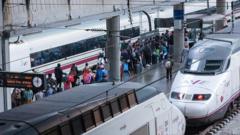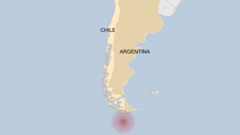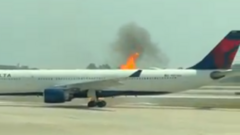Authorities have assured the public that rail services will resume, with minimal disruptions reported going forward.
**Paris Transports Set to Resume Following Defusal of WWII Bomb**

**Paris Transports Set to Resume Following Defusal of WWII Bomb**
Train operations in Paris are expected to normalize after a WWII bomb near Gare du Nord was successfully defused.
During an unexpected interruption, an unexploded World War II bomb located close to Gare du Nord in Paris disrupted local train services on Friday. French Transport Minister Philippe Tabarot announced that all Eurostar trains would be suspended for the remainder of the day, with a return to regular operations anticipated by Saturday. Local rail traffic is also scheduled to recommence at 17:00 GMT following the evacuation of more than 200 residents from nearby homes in Saint-Denis and the temporary closure of a section of the main ring road.
The 500-kilogram bomb was unearthed two meters beneath the surface at a construction site just over a mile north of Gare du Nord, which is Europe’s busiest train station. Eurostar's Chief Safety and Stations Officer, Simon Lejeune, described the situation as "complex" and opted to cancel all 32 services between London and Paris to provide clarity to passengers amid the ongoing uncertainty. He expressed regret for the disruption and mentioned that customers could access the Eurostar website for change of bookings, refunds, or vouchers.
The explosive was found approximately 200 meters away from a busy section of the Paris périphérique as well as near the A1 motorway, resulting in considerable traffic delays throughout the region. Authorities indicated that while six schools and a care facility for the elderly were within the evacuation zone, they were deemed safe as their windows did not overlook the immediate area.
Some Eurostar services remained unaffected, with normal operations continuing between Brussels and Marne-la-Vallée, as well as connections between London and Brussels and London and Amsterdam. However, high-speed TGV trains heading to Gare du Nord faced significant cancellations, with certain services redirected to Gare de Lyon.
Historically, railyards around Paris were targeted during World War II air raids, explaining the ongoing discovery of relics from that era. Eurostar pledged to offer passengers complimentary ticket exchanges for future travel, and announced plans for two additional trains on Saturday to accommodate disrupted travelers.
Queues formed early at St Pancras International in London as stranded passengers sought rebooking options. Many were left scrambling for alternative travel arrangements. Jess Sayer from Norwich, celebrating her 40th birthday, expressed frustration over being stuck in Paris with limited options. Others faced urgent commitments back home, such as Anna Griffiths, who missed critical events due to the cancellations, and Karen Hamblin, who sought alternative plans to celebrate her husband’s birthday.
As concerns grew over the impact of these disruptions, passengers experienced widespread confusion, leading to numerous individuals attempting to find flights, hotels, and other means to reach their destinations.
The 500-kilogram bomb was unearthed two meters beneath the surface at a construction site just over a mile north of Gare du Nord, which is Europe’s busiest train station. Eurostar's Chief Safety and Stations Officer, Simon Lejeune, described the situation as "complex" and opted to cancel all 32 services between London and Paris to provide clarity to passengers amid the ongoing uncertainty. He expressed regret for the disruption and mentioned that customers could access the Eurostar website for change of bookings, refunds, or vouchers.
The explosive was found approximately 200 meters away from a busy section of the Paris périphérique as well as near the A1 motorway, resulting in considerable traffic delays throughout the region. Authorities indicated that while six schools and a care facility for the elderly were within the evacuation zone, they were deemed safe as their windows did not overlook the immediate area.
Some Eurostar services remained unaffected, with normal operations continuing between Brussels and Marne-la-Vallée, as well as connections between London and Brussels and London and Amsterdam. However, high-speed TGV trains heading to Gare du Nord faced significant cancellations, with certain services redirected to Gare de Lyon.
Historically, railyards around Paris were targeted during World War II air raids, explaining the ongoing discovery of relics from that era. Eurostar pledged to offer passengers complimentary ticket exchanges for future travel, and announced plans for two additional trains on Saturday to accommodate disrupted travelers.
Queues formed early at St Pancras International in London as stranded passengers sought rebooking options. Many were left scrambling for alternative travel arrangements. Jess Sayer from Norwich, celebrating her 40th birthday, expressed frustration over being stuck in Paris with limited options. Others faced urgent commitments back home, such as Anna Griffiths, who missed critical events due to the cancellations, and Karen Hamblin, who sought alternative plans to celebrate her husband’s birthday.
As concerns grew over the impact of these disruptions, passengers experienced widespread confusion, leading to numerous individuals attempting to find flights, hotels, and other means to reach their destinations.





















